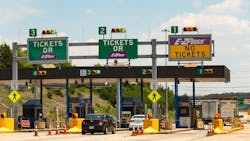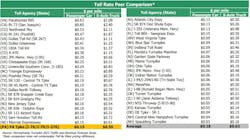Toll increases go into effect in Pennsylvania this week.
According to the Pennsylvania Turnpike Commission, the increases approved last year begin across the highway system at 12:01 a.m. on Sunday, Jan. 7.
The Commission approved the 5% increase for E-ZPass and Toll By Plate customers on July 18. The most common toll for a Class 8 tractor-trailer will increase from $14.40 to $15.20 for E-ZPass and from $29.40 to $30.90 for Toll By Plate. The most common toll for a passenger vehicle will increase from $1.80 to $1.90 for E-ZPass customers and from $4.40 to $4.70 for Toll By Plate customers.
E-ZPass and Toll By Plate rates for passenger and commercial vehicles will round up to the nearest dime after the increase is applied. E-ZPass users will save nearly 60% on tolls, according to the commission.
“Our annual toll increases directly support the escalating Act 44 debt service we have had to manage due to the mandates of Act 44 of 2007,” said Rick Dreher, PTC CFO. “However, even given that significant financial management challenge, our per-mile toll rates are lower than national toll averages and remain in the midrange among the 47 toll roads in the U.S.”
See also: Bestpass acquires Fleetworthy to offer comprehensive toll, compliance management solution
With the state’s passage of Act 44 of 2007, the turnpike was obligated to pay PennDOT $450 million per year to fund non-Turnpike transportation needs around Pennsylvania, totaling $8 billion since 2008. Though the payments have been greatly reduced, and no new Act 44 debt is being accrued, the Turnpike must continue to raise tolls to pay the resulting escalating Act 44 debt service due through 2051.
In addition to yearly toll rate increases, the PTC has taken the following internal steps to control costs and meet these financial obligations:
- Managed debt efficiently, availing opportunities to refinance debt at lower interest rates and have generated over $1 billion in interest rate savings.
- Controlled operating expenses and have had essentially flat operating costs since 2016 to ensure the Commission is running leaner to support the costs of Act 44.
- Maintained a leaner workforce; current complement is nearly 50% lower than its peak in 2002.
- Cut the 10-year Capital program by $1 billion in 2017, focusing on protection projects rather than reinvesting in reconstruction and expansion efforts.
- Identified about $500 million of non-toll funding sources to pursue, like EV chargers at service plazas and commercializing the fiber optic network being installed across the system.
“Our goal is to be good stewards of the customers’ dollars, and we are doing so by controlling costs, operating a safe and reliable road with premium services, funding transportation projects across the Commonwealth (Act 44 projects), and reinvesting back into our system,” said Mark Compton, PTC CEO. “The pace and scale of our toll increases are directly attributable to Act 44.”
About the Author
FleetOwner Staff
Our Editorial Team
Kevin Jones, Editorial Director, Commercial Vehicle Group
Josh Fisher, Editor-in-Chief
Jade Brasher, Senior Editor
Jeremy Wolfe, Editor
Jenna Hume, Digital Editor
Eric Van Egeren, Art Director

